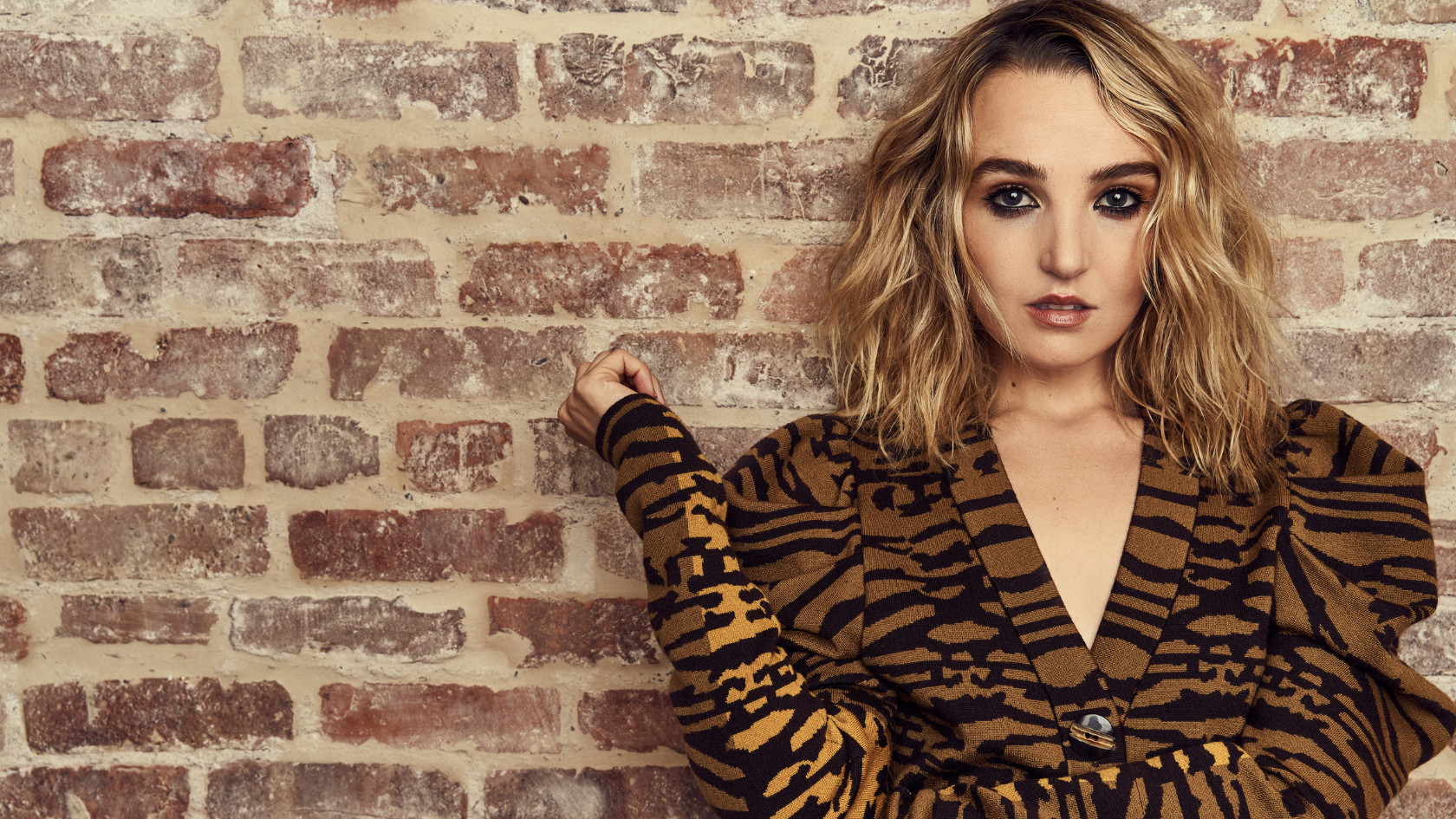
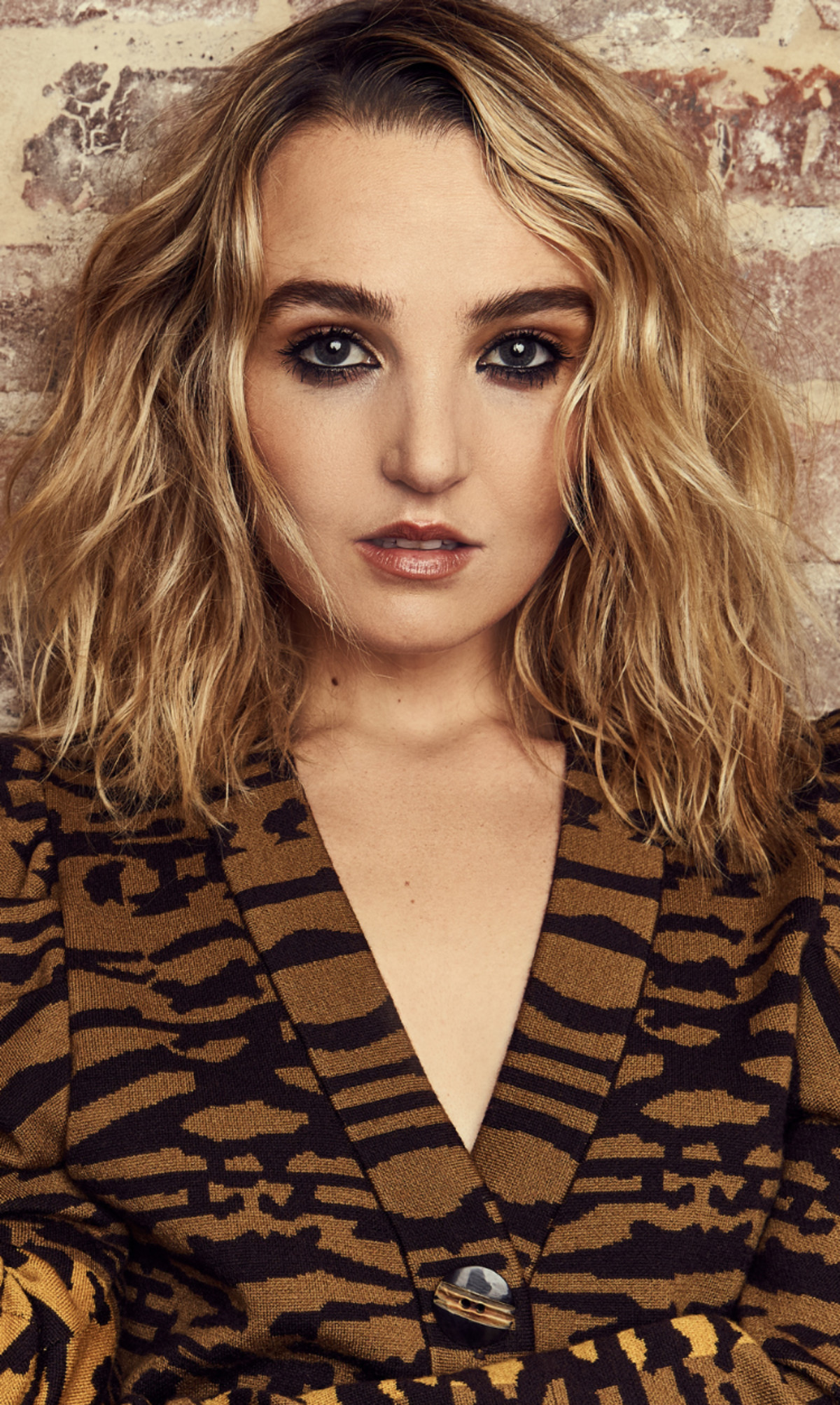


CHLOE FINEMAN
Gifted
With Viral Popularity and Success in Both Comedy and Drama, Saturday Night Live Breakout Star Chloe Fineman is the Whole Package
PHOTOS BY RANDALL SLAVIN WORDS BY TAMARA RAPPA
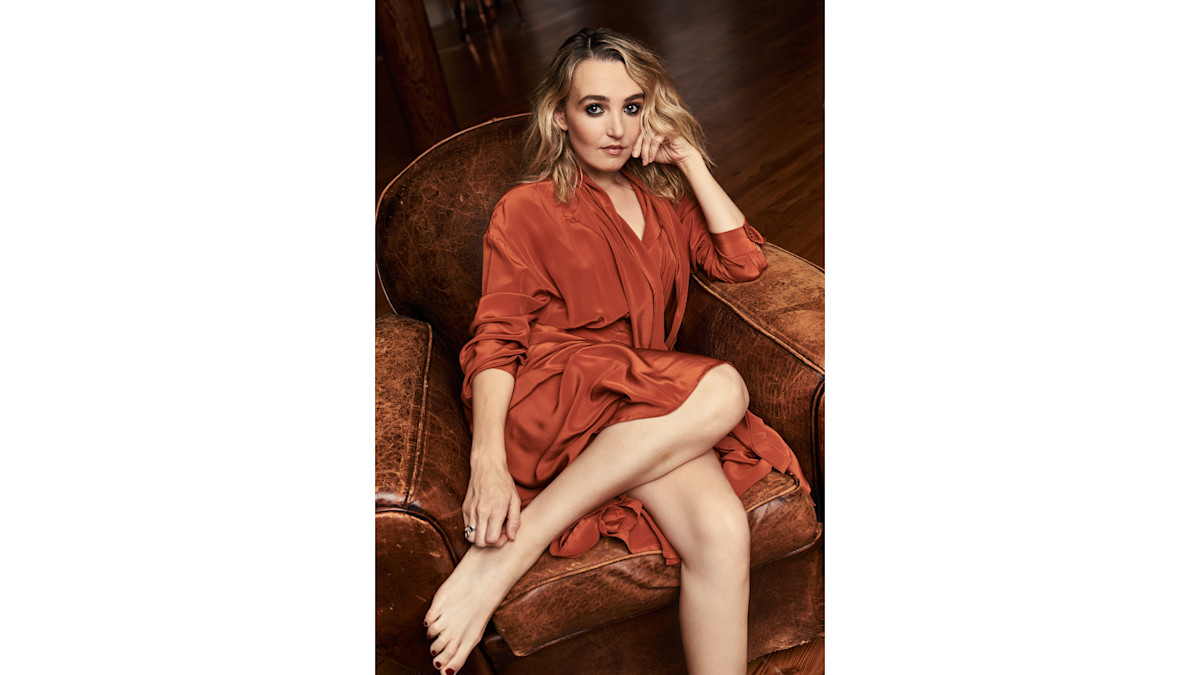
ABOVE PHOTO: Ulla Johnson Sweater. Marc Jacobs Dress.
Listen to the extended interview on episode 88 of the Story + Rain Talks podcast, releasing on 12.15.21 on Apple Podcasts, Spotify, or wherever you listen.
Tamara Rappa: Your mother is a painter. What was life like growing up in Berkeley and in your family? Was it a totally creative atmosphere? One of your sisters is an artist, too.
Chloe Fineman: It was too creative! It was quintessentially bohemian hippie-doodle. My mom always has had an art studio. At my house now, there are two art studios. My sister took over the garage. They're always painting, messy and creative. My dad, when I was little, did a lot of improv. When my mom was pregnant with my sister, I would go to improv with my dad. I think that sparked [my creativity]. My sister went on to do painting, and me, improv.
"Believing in fairies was not unusual in Berkeley, California."
TR: When you recall the creative atmosphere of your youth, if you were to come up with a picture in your mind, what are you seeing?
CF: Believing in fairies was not unusual in Berkeley, California. It's me and my sister, outside in our garden. There's fully a castle, and my mom has made us fairy food. We would get up in the middle of the night with glitter.
TR: You've been acting since you were a kid and in high school. Which came first for you, humor, or love of acting and drama?
CF: Acting, one hundred percent. My friends were very funny and unfiltered growing up. I always loved acting. Having funny friends made me end up in comedy, but that was never what I thought my life would be.
"I was always extra and out of pocket. I was always, like, out-of-pocket-Chloe."
TR: As a teenager, you weren't necessarily the one cracking the jokes...
CF: I was always extra, and out of pocket. Berkeley has a lot of slang. I was always, like, out-of-pocket Chloe.
TR: I've never fully understood what out of pocket means.
CF: Out pocket is like yelling in public. Unfiltered. I was always crazily unfiltered. My humor came from it, from being extra. But I always wanted to do Shakespeare and be in independent films.
TR: Did you fall in love with New York City instantly during your time in school at NYU's Tisch and Stella Adler?
CF: I remember coming [to New York City] in the fifth grade, being in the cab going into Manhattan and thinking, 'This is where I'm meant to be.' Now that it's winter, I'm like, 'Get me out!' I look back and I'm like, 'What did I do with my life for those four years?' I fully drank the Kool-Aid. And I would go back in a heartbeat. I just absolutely loved it.
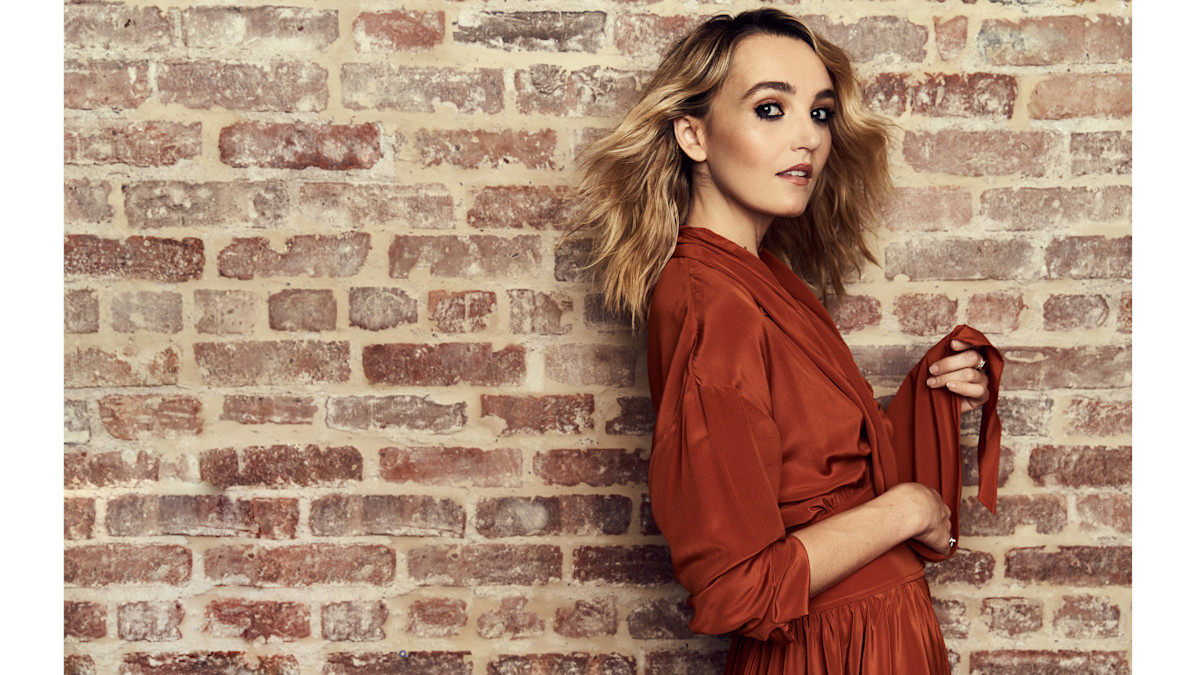
Marc Jacobs Dress.
TR: What was a struggle for you during those days? Was there anything that you were struggling to accomplish, or struggling to get used to?
CF: For whatever reason, I've always put myself in really competitive environments. Tisch was crazy competitive. Who is doing which scene and...you're with people who are at the top of their game. It's not an easy school to get into. The people I was in school with have all gone on to have crazy big careers, whether in writing or Broadway. I was with the top tier, and that's very motivating, but also a huge challenge. And in L.A., at Groundlings---the exact same thing. SNL? Obviously that, on crack.
"I think the thing that surprised me the most is how much you feel like you're in an office, and the college-ness of it."
TR: You've been a part of sketch comedy groups Groundlings and Upright Citizens Brigade before landing on Saturday Night Live. How do you describe the differences between each, and what did you take with you into SNL from the others that prepared you for the experience of being a Saturday Night Live writer and cast member?
CF: SNL's unlike anything. It's a very weird hodgepodge of stand-up comedians and sketch performers who do characters. Then, there's this lonely island of a video component. Being in Groundlings helped me with [creating] these amazingly memorable characters. That's Kristen Wiig; Will Ferrell. UCB is about the structure of a sketch, funny setups, the stand-up component, and then having to perform to your best ability. When I'm acting is when I feel I have control over the job.
TR: What was the most unexpected thing you've experienced in working on legendary Saturday Night Live? Did anything catch you by surprise in terms of atmosphere, or process, or people, or anything else?
CF: Everything was unexpected. One thing I find kind of comforting, is that I don't know of anyone at the job who ever thought they would be there, or that they could be there. I think that's healthy. None of us were like, 'This has been my dream.' Maybe for some, but I feel like a lot of us never saw it for ourselves in our lives because it's such an unimaginable, crazy job. Honestly, I think the thing that surprised me the most is how much you feel like you're in an office, and the college-ness of it. A lot of people there are from NYU, too. A lot of nights I think, 'Am I just, like, in the library at NYU?!' On Tuesday nights it's as if you're in the library, but you have to be goofy and creative. It's this weird dynamic of those two very opposing things.
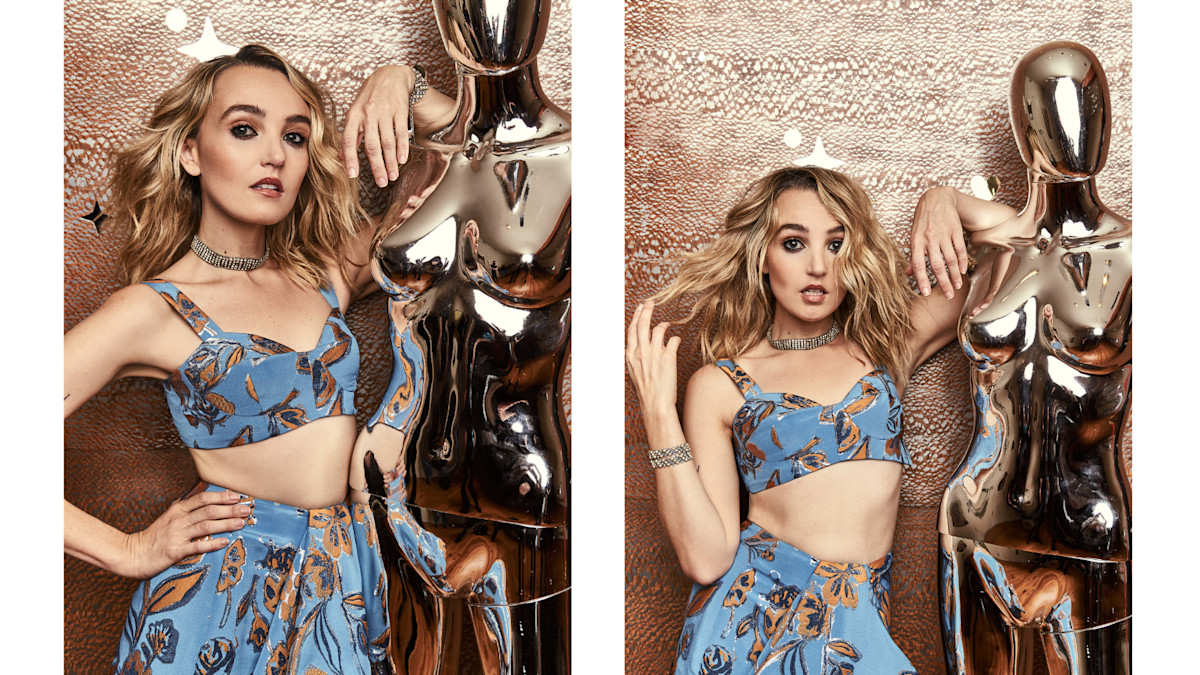
Prabal Gurung Top and Skirt; Saint Laurent by Anthony Vaccarello Choker and Bracelet.
TR: What do you look forward to the most each week, working on SNL?
CF: Whatever the wig or the costumes are! I was a queen and all I cared about was, 'This [sketch] needs to get on because of this costume!'
"Every Monday is a completely fresh slate. You get to reinvent yourself. Your balloon is popped, and then you have to fill it up every Monday. It's a crazy mental exercise that I think I'm actually getting better at."
TR: What's the toughest part of the job?
CF: Definitely your stuff not making it. Sometimes something will do well at the table reading, and for whatever reason it doesn't get picked, and that's defeating. Or you think it's great and it just eats total shit and then you're defeated. But every Monday is a completely fresh slate. You get to reinvent yourself. Your balloon is popped, and then you have to fill it up every Monday. It's a crazy mental exercise that I think I'm actually getting better at. But if you talked to me two weeks ago, I would've been like, 'I'm not meant to be here'.
TR: You build that muscle, you build that resilience, and you get used to the dynamic.
"My dream, in this job, is to get to not taking it so seriously. Being light, being in that head space—you're more creative. I think I'm slowly starting to care less. Work hard, care less."
CF: Yeah. I think the people who have been [at SNL] longer aren't as serious, it's not as life or death. They've gone on the roller coaster so much. There's a lightness and an ease. I definitely noticed that when Eddie Murphy and Will Ferrell came back...there’s a lightness. My dream, in this job, is to get to not taking it so seriously. Being light, being in that head space—you're more creative. I think I'm slowly starting to care less. Work hard, care less.
TR: It's been how many years now? Two or three?
CF: I'm in the beginning of my third year. That's the other thing. It's all still so, so new.
TR: Is there anything else you do besides what you do in rehearsal all week, to prep for SNL? Is there anything that you do at home, or think about all week?
CF: I've always, since the beginning, sent videos to my best friend, Casey [Thomas Brown]. People think we're married. I send Casey videos and say, is this okay? I film myself. Also, we have this weird thing where our show rehearsals are recorded, and you can watch them on your phone. It's very cringy to have to look at that. But it's something you have to do because sometimes you have no idea that the camera's here...but you're like, there.
"No matter how exhausted you are, you have to sell your material."
TR: It's interesting to think about the tech aspects of Saturday Night Live. The viewer doesn't think about the intricacies of the technical aspect. You know there is one, but in the way you just described, it seems very technical.
CF: It's hyper-technical. There are cue cards; there are all these cameras---and you're kind of aware of where they are. Watching it back is huge. Especially because there's sort of no director. There's a camera director, but they're focused on the camera. They're never going to tell you about your acting. And the writers don't, usually, because they're focused on writing and on their sketch making sense. So you kind of have to be your own director, which is freeing. But it's also on you, and that's really hard.
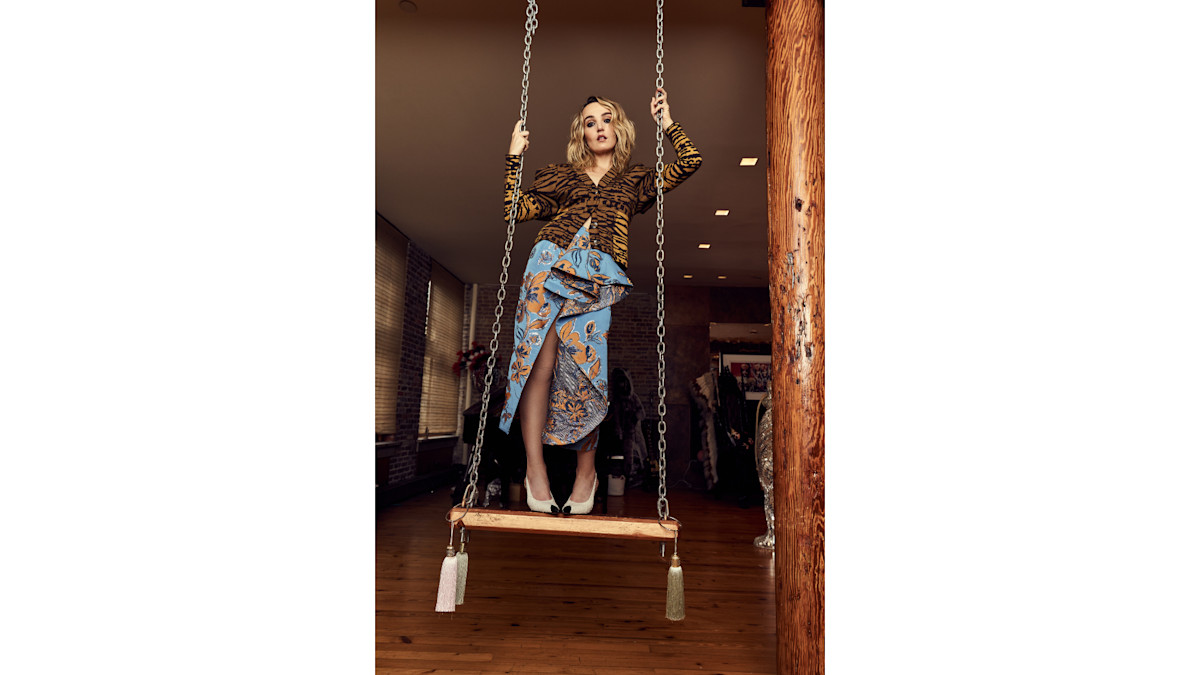
Ulla Johnson Sweater; Prabal Gurung Skirt; Saint Laurent By Anthony Vaccarello Pumps; Rush Jewelry Design Earrings.
TR: What is the structure for rehearsal like all week?
CF: Sundays and Mondays are when you start to panic and think about what you're going to write. Do I annoy a writer on Sunday night, or do I wait until Monday morning?
"Is the host funny in it? That's a big part of things, making the host funny."
Then, on Monday mornings, I text people who I think would be good to write with. I kind of scramble ideas. Usually they're shot down. This week I got lucky. Then you try and pair yourself with writers, and we brainstorm on Monday nights. On Tuesdays, some people get in at like 11; some people get in at 5. I usually like to get in at around 2. Ideally, I'm out by like 2 in the morning. Some people stay until like 4. You're just writing, pitching, and writing. You're really fine-tuning and making it great. It's sort of this interesting moment of how perfect you want to make something, and you really have to, because you have to sell it the next day. I'll be on like four or five hours of sleep, get up, and look at it again, going back and forth, fine-tuning.
TR: Looking at it with a fresh perspective.
CF: A fresh set of eyes. Is it ten pages? Is everyone going to score? Is the host funny in it? That's a big part of things, making the host funny. You hand it in, ideally, by 11, and at 2 o'clock you're in the car going to the studio; then we have our table read, which is usually from 4 to 8:30, which doesn't sound like a long time, but it is so long. No matter how exhausted you are, you have to sell your material. Yesterday I was exhausted because we'd been at it for six or seven weeks at that point. We had one week off but It really felt like we'd done eight weeks of shows. I felt like I was like in quicksand. But then you're like, 'Go to do it!' And when people laugh, it's the absolute best.
TR: The process of working on Saturday Night Live takes a lot of discipline.
CF: ...A ton of discipline. You sell your material and then we all kind of hang around, both anxiously or confidently. At around 9:45 or 10, we find out what's gotten in. After that, what happens is costumes, hair, prosthetics, and sets are filled out. We kind of rotate, like a buffet.
TR: Like an assembly line.
CF: We do an assembly line and we're like, 'This is what I'm thinking for the wig. This is what I'm thinking for the costume.'
"Last year we had on Elon Musk. This Ooli sketch got on, which I was not expecting, because Elon didn't love it. But when we did it at the table read with the accents, he thought it was funny. I was fully expecting that it was never going to see the light of day."
TR: You’re collaborating with the host.
CF: Yes and most times I never think something I created will get on, so I don't take the time to be like, 'This is the wig.' Usually, I'm kind of scrambling, which is fun.
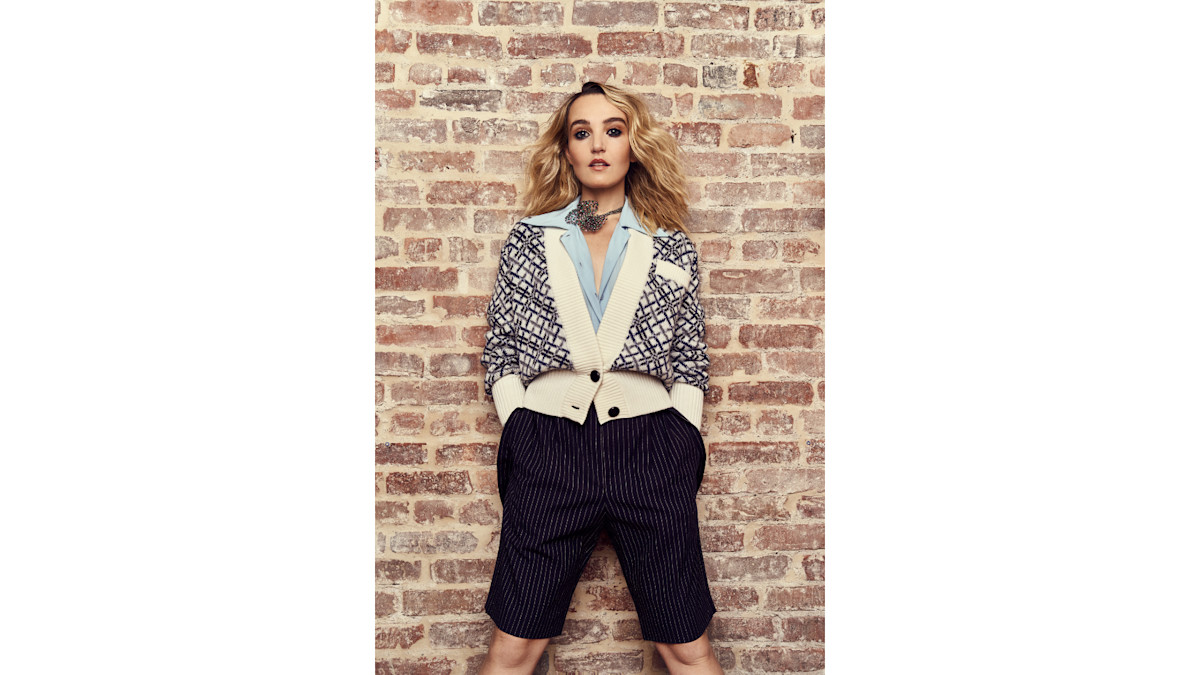
Saint Laurent by Anthony Vaccarello Shirt, Sweater, and Choker; Isabel Marant Shorts.
TR: You probably get your best ideas that way. A lot of what we talk about with creatives on our podcast is, how do you get your best ideas? I would think you probably get great ideas from acting on the fly like that.
CF: Totally. Last year we had on Elon Musk. This Ooli sketch got on, which I was not expecting, because Elon didn't love it. But when we did it at the table read with the accents, he thought it was funny. I was fully expecting that it was never going to see the light of day. A part of our process is Zoom'ing. The writers split up into two, and we Zoom to punch up all the scripts to make them way funnier. After that, you're Zoom-blocking. I go in on Thursdays and Fridays at 4 and then we actually start blocking. If you're in a pre-tape, you're up really early or up really late doing that. Then, Saturday's the show. It's an insanely quick turnaround.
"Sometimes the host can really be valuable. Who knew Kim Kardashian was going to fight for a sketch I wrote with my friends?"
TR: Punching up the script sounds like a really fun part of the process.
CF: Usually it is. It's also some very tired people on Zoom. Sometimes it's overwhelming because all of these genius writers have such funny ideas, but you still have to keep the sketch tight. The ideal is only four minutes, if it's long...between four and six--- that's a really long sketch.
TR: I had never thought about hosts weighing in on sketches. How do you bat around those ideas with the host, and be able to move things forward? I'm thinking about this as someone who runs daily and weekly content. When you have to factor that in, how do you either move forward or decide to kill it?
CF: I'm sure it's kind of similar. We want the host to shine; we say, 'score.' We want to write something that they'll score in. I think I'm slowly, finally, sprinting towards getting what that means. With Elon Musk, he really scored in a sketch at the table, and for a multitude of reasons, it got on the show. When the host is funny, you're set. Also, it sort of takes the pressure off you when you think, yes, they can do this, so maybe I'll think about a sketch within this world. Can the host do this dance? Can they do this? It's not about me and my ideas, like it was in Groundlings four years ago.
"My struggle is that I feel like I'm such a girl. I've got such a female, maybe eccentric, brain. I like the Housewives, and my comedy inspiration growing up was Ab Fab."
TR: The goal is to make sure that the host is in a place where they feel comfortable.
CF: When Kim Kardashian hosted, we wrote this People's Court sketch. And because we pitched it to her and she loved it, but it wasn't the best at table read, she fought for it. The show was like, 'I don't know', and Kim helped us get the sketch on. Sometimes the host can really be valuable. Who knew Kim Kardashian was going to fight for a sketch I wrote with my friends? So cool.
TR: That was a really funny sketch. Which sketches have you written are you are most proud of?
CF: I think the one I'm most proud of is Murder Show. It's a song about women's obsession with true crime. When a sketch makes it on TV, there's something about me having an idea out of nowhere, and me and other writers---that was Dan Bulla, Steven Castillo, and Jasmine Pierce---taking it to the next level, and how produced it gets. Obviously, I love all the impression stuff, like my Drew Barrymore impressions. And having the cast really score makes me happy.
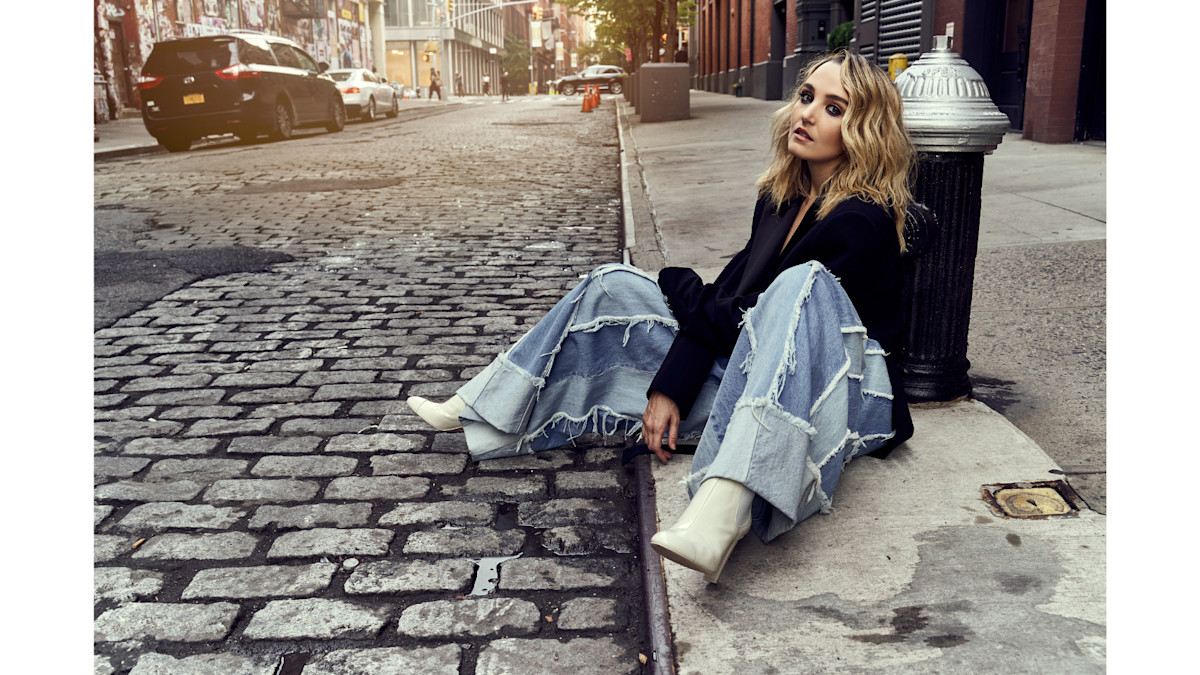
Balmain Jacket and Pants; Chanel Boots.
"Jokes are such currency on the show, to the point that you'll know when you're cut. You always want to stay in a sketch."
TR: Is there a main topic or a basis for which you find your inspiration in general, and for your sketches on the show?
CF: Gosh. My struggle is that I feel like I'm such a girl. I've got such a female, maybe eccentric, brain. I like the Housewives, and my comedy inspiration growing up was Ab Fab. Sometimes I think I struggle with fitting it all into the world of SNL, which isn't a boys club, but it's definitely hard-hitting jokes. Jokes are such currency on the show, to the point that you'll know when you're cut. You always want to stay in a sketch. We have a dress rehearsal at 8 o'clock, and if you don't get a laugh, oftentimes you'll be cut from the sketch, because we're trying to fit in all of these sketches. Hard jokes are hard for me, it's not how my brain works at all. I've always liked the more behavioral stuff, stuff from Kristen Wiig and Molly Shannon. There's a struggle to sell that kind of stuff at a table read as opposed to the hard jokes.
"An impression is like a tiny little biopic, for a very short amount of time."
TR: What exactly do you think it takes for you to be such a perfect mimic in your impressions, the impressions you are so known for? What qualities do you possess that make you so good?
CF: Ever since I was young, I've had a deep obsession with biopics. Cate Blanchett in Elizabeth was my favorite thing in high school. Meryl Streep. Anything from those transformative actors really sticks with me. I was obsessed with Charlize Theron in Monster when I was in the seventh grade. Anthony Hopkins. Historical stuff or biopic stuff. An obsession with that led me to want to do it. An impression is like a tiny little biopic, for a very short amount of time. I want to play characters, but, man, do I love a biopic.
TR: At your age, you've had a lot of training and experience to date. Are you someone who is enamored with learning?
"I got lucky with Instagram in a weird way. Zoë Kravitz knew who I was because I did impressions from Big Little Lies."
CF: Definitely. Maybe that's a Jewish thing. Maybe and my sister were over-educated! My sister and I knew what we wanted to do. At young ages, we proved it to our parents so they would let us go to art school. My sister went to grad school at the Royal College of Art.
TR: You have so many majorly cool projects under your belt, and have played some great roles. You are and have been a member the best sketch comedy groups. You've acted in Search Party, Zoë Kravitz’s High Fidelity; Apple TV+'s Dickinson. You've landed some pretty incredible opportunities alongside being front and center on SNL. Next, you've got some plum film projects coming up with Noah Baumbach, the all-star cast of the upcoming film Babylon. And of course, the Father of the Bride remake in which you have the really fab role of the wedding planner. Was and is achieving balance and success in both acting and comedy, hard to do? Or are the categories and parameters that once existed in entertainment no longer?
CF: That's a good question. I think they're kind of no longer. When I try to put myself in one box or another, it feels empty. I got lucky with Instagram in a weird way. Zoë Kravitz knew who I was because I did impressions from Big Little Lies. I got Search Party because of doing a character 'Queef' on Instagram that Charles Rogers thought was funny.
"You're unemployed, and it helped me with my existential dread of being 30 in L.A. ...I would make videos with my friends."
I used my phone to show what I can do. That, or I was just very free and loose about it. It was a really big gift. I didn't have to go through casting directors, driving in my car, being nervous and all that stuff. Obviously it's still the process. The stuff that I love the most is really dark drama where there's levity, or a comedy that has drama, like Jennifer Coolidge in White Lotus. My dream has always been that combo. The two don't feel separate for me.
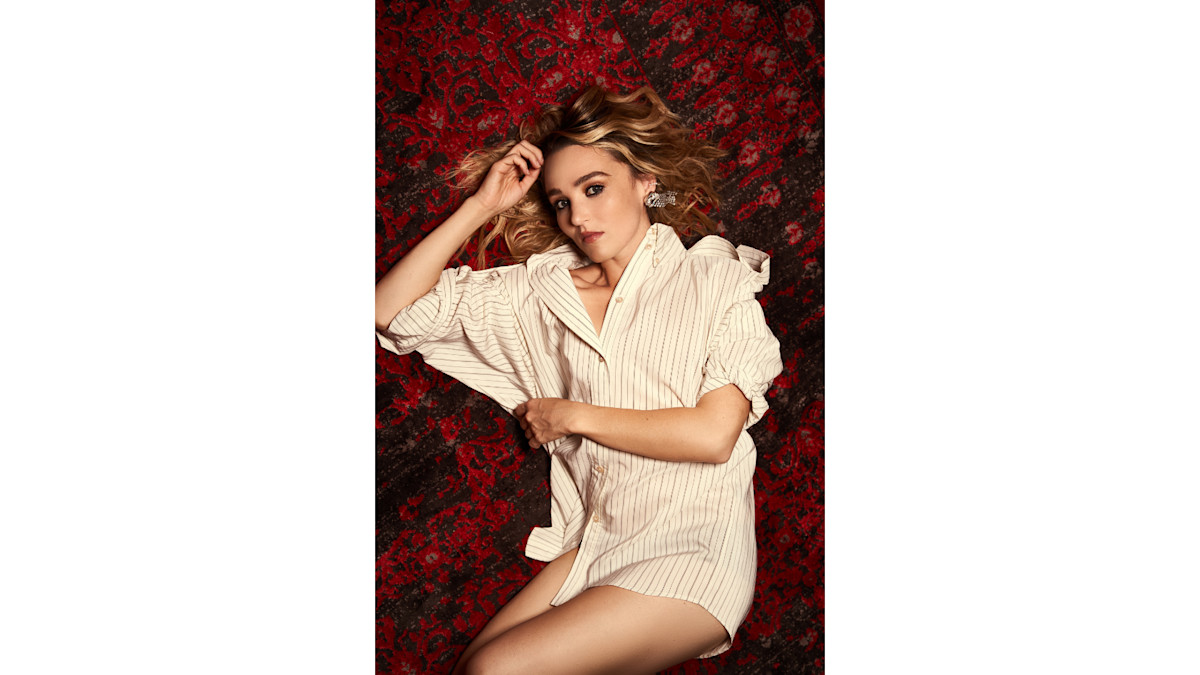
Isabel Marant Shirt; Saint Laurent by Anthony Vaccarello Earrings.
TR: You're active on social media and you've achieved some success because of it. But how do you still have fun with it? Do you find that there's a fine line between it being work, or a machine so tied to your work, and a creative outlet?
CF: I think it's always changing. It was such a gift and a tool, especially before SNL. You're unemployed, and it helped me with my existential dread of being 30 in L.A. ...I would make videos with my friends. It was amazing. During the pandemic, it was such a relief. It felt good to make stuff and to make people laugh during a dark time. It was crazy to see like, Ziwe Fumudoh, or Meg Stalter, or Benny Drama...all of these people I know, explode, because of how they were freely putting out their things. Ziwe has a show now. Careers were made. The pandemic shutdown was kind of a year, but in the six month time from March to August or whenever, careers were totally made, which was very cool. I struggle with saving stuff, wanting to do it on SNL. I’m always super neurotic about it. 'Do I save it?’ or, ‘Now it’s too late!’
"Kenan [Thompson] makes it look so easy, but what he's doing is technically genius."
TR: How is your process as an actor different from your process for live sketch comedy?
CF: That's a good question. Timing is a big thing. Sketch comedy is so much about the timing and how do I say this, the line, so the audience really laughs. In working with [Writer-Director] Noah Baumbach, for example, I get to live in it more, which I love. With film, you can really live in something.
TR: How are you able to straddle the line between comedy and drama, what makes you able to do both? Not everyone can be comedic. Not everyone can do both. You manage to do both so well.
CF: Thanks. Gosh! This summer I felt so rusty going back to drama and having a cry, but I just trusted that it was there. Comedy is always about practicing, doing it, and watching it. If it’s drama, do I feel something? If it’s comedy, am I laughing? This sounds really snobby, but I had a lot of Shakespeare training. It's very helpful for comedy, because it's about line delivery and distinction.
TR: Allocution.
CF: Allocution. Kenan [Thompson] makes it look so easy, but what he's doing is technically genius. His voice goes here...and then goes here. Speaking in all those levels is very much how Shakespeare is.
TR: The sing-song musicality.
"Dickinson was very cool to me, because it allowed me to go back to more dramatic stuff, playing a historical figure. The text was flowery. I felt like I was in heaven."
CF: The sing-song, yeah, the musicality. Musicality is the rhythm, and musicality is such a thing in comedy. Obviously there's a rhythm and musicality to drama, but in comedy, it's on crack. And that's what I'm always trying to get better at.
TR: What are you absolutely craving to do as an actor at this point in time?
CF: When we had an at-home episode, I played Ooli and this other girl in an Airbnb sketch. Playing two people was very, very thrilling, and exciting. So, definitely that. Certainly, a biopic. And dark comedy.
TR: What was working on Search Party like?
CF: Search Party was my first taste of collaborating with friends. I know writers Charles Rogers and Jordan Firstman, and I know Sarah-Violet Bliss. All the Search Party people are friends of mine or people I've come up with, or looked up to---especially John Early, who I just worship. That one was just thrilling to do.
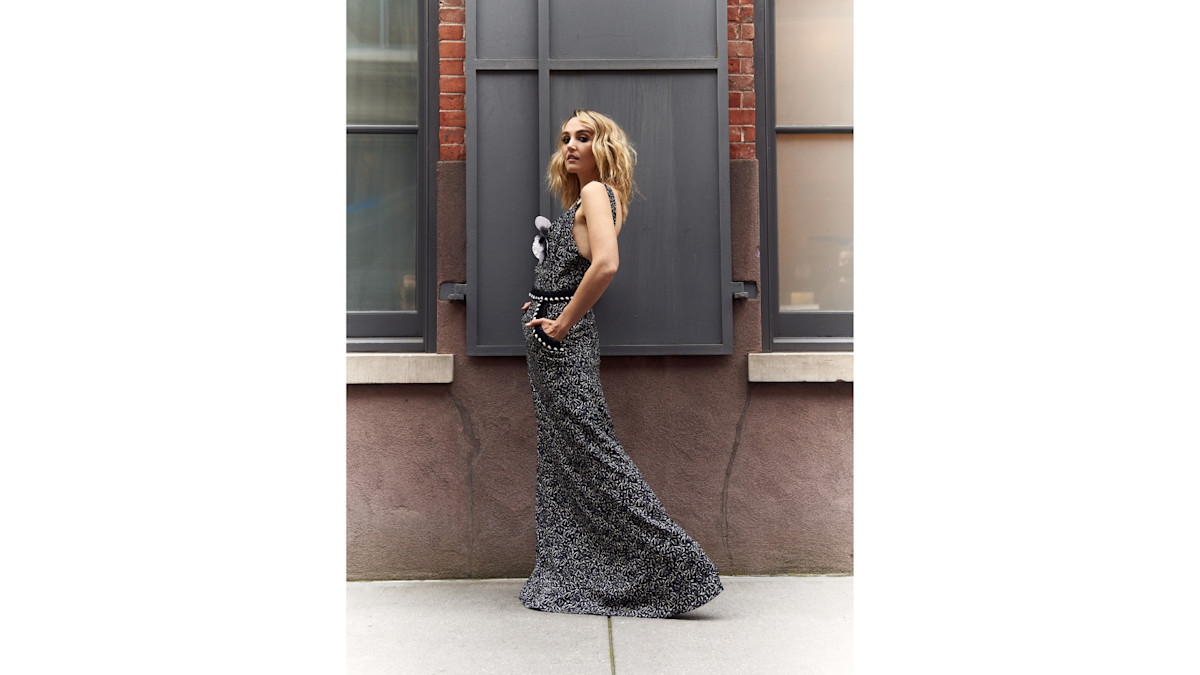
Chanel Dress, Brooch, and Boots.
TR: In playing Sylvia Plath this season on Dickinson, did you do any research to help you figure out how to exactly play Plath within the modern Dickinson series context?
"Obviously I pitched a version of all these German women I always play, and they were like, 'Nope, you're going to play a white girl.'"
CF: I was weirdly obsessed with Sylvia Plath in college. I vaguely remember reciting her poetry while wearing all black clothing. Also I chain smoked and loved being sad. So I returned to my love of her. I watched and listened to her reciting her poems on YouTube. But it was important that she exist in the world of the show, so as much I wanted to do a Katharine Hepburn---if you listen to Sylvia, she’s doing full mid-Atlantic at times---I modernized her a bit but connected to her essence. She was brilliant and had great wit. Dickinson was very cool to me, because it allowed me to go back to more dramatic stuff, playing a historical figure. The text was flowery. I felt like I was in heaven.
TR: Casting you as the wedding planner in the upcoming Father of the Bride remake was so clever. I feel like there's a story there.
CF: I met with the director. I really, really loved him. Obviously I pitched a version of all these German women I always play, and they were like, 'Nope, you're going to play a white girl'. With that, we talked about who I find funny, like the Elle Woods character in Legally Blonde. I was also obsessed with the show The Home Edit at the time. In thinking about the planner's assistant role, on The Home Edit, they always have these funny assistants. I was in L.A., and Casey was like, 'Why don't we just improv, and send it to them?' We sent in this improv of us being the two characters, of him handing me my phone, finishing my sentences...I ended up getting to do the movie with my absolute best friend and comedy partner.
TR: The amazing Noah Baumbach is adapting the novel White Noise by Don DeLillo and you're a part of that film. When you think of Noah, what comes to mind?
"Everyone had the same goal of making the best movie, it didn't matter in how many takes. He’s thorough, a real artist, and I was really blessed to be in his presence."
CF: Virtuous. A genius. Someone who is extremely collaborative, but also knows what he wants. I'm so lucky that I get to work with the greatest actors who have a week with us at SNL, and these wonderful directors. People who really put extra effort in. I think Noah was the king of that.
TR: Detail, attention to detail.
CF: Detail, and getting it, you know, until we are satisfied, and everyone's in it with him. It was very beautiful and collaborative. Everyone had the same goal of making the best movie, it didn't matter in how many takes. He’s thorough, a real artist, and I was really blessed to be in his presence.
TR: What about this all star cast you're a part of in upcoming Babylon. How did that role come to you? The film features Brad Pitt, Margot Robbie, Olivia Wilde, Tobey Maguire, Eric Roberts. The list goes on.
CF: I know, I'm more excited to see it than most people! Honestly, I just Zoomed with [Writer-Director] Damien [Chazelle], and he kind of told me about it, and I showed up.
"I'd never seen a female producer or actor who had such power, control, say, and check-in with the director. All of it was super inspiring, and it will stick with me forever."
TR: You were so spot-on playing a social media influencer in Zoë Kravitz's High Fidelity. What was it like working on that production and with Zoë? I loved the series.
CF: The big thing for me was just how much of an inspiration Zoë is, because she was a producer on it. It was the first time I got to experience a woman really take charge; I'd never seen a female producer or actor who had such power, control, say, and check-in with the director. All of it was super inspiring, and it will stick with me forever.
TR: How do you get your best ideas? When do they tend to come to you?
CF: Usually when talking with friends. When I'm talking with my best friend Casey, or watching something. It's always through conversation. I have to always remind myself: you don't create in a vacuum.
TR: What do you do when you're stuck? Is there anything that helps get you back to your creative self?
CF: Walks, I'd say. Crying. I'm someone who can't bottle it in. Maybe to a fault. I'll get all the emotions out, and then keep going.
TR: Who's the funniest person? Who makes you laugh the most?
"I have to always remind myself: you don't create in a vacuum."
CF: Certainly my best friend, Casey. And my friend Hannah Pilkes. Everyone on SNL. Kenan, endlessly.
TR: Just looking at Kenan makes me laugh. He's just that funny.
CF: Pete [Davidson] really makes me laugh. Colin [Jost], Cecily [Strong], Kate [McKinnon], the newbies, like Sarah [Sherman]...
TR: How do you envision writing playing a part in your career, as you move forward?
CF: It will play a huge part. It's the thing that scares me because it's not what I came up doing or what I studied. The good student in me thinks that I'm 33 and feeling like I'm literally just learning how to write. But it's the thing that gives you the most freedom in this industry. You get to make your own thing. SNL really teaches you that.

For our Cover Archive cover, Chloe Fineman wears a dress by Paco Rabanne and necklace by Larkspur + Hawk.
"I have been a really big fan of Kat Burki skincare for a while. The vitamin C cream is... I feel an emotional shift in my body when I put it on my face."
"I have an obsession with sunglasses. It's an addiction. I have a little too many, but I really like AHLEM cat-eye sunglasses."
"I discovered 6397 skater jeans. I bought them in every color."
"I've Uber Eats'd from Jack's Wife Freda so much that I'm in their top 5 percent of customers, which is humiliating. I get the kebab, and I share some of the chicken with my dog."
"I'm decorating my apartment right now, and I love this store I discovered called Dyphor New York in Brooklyn. It's totally my vibe."
"I'm obsessed with Labucq shoes. They have a popup in Nolita, and I immediately bought two pairs. Their loafers are amazing."

"I combed Chloe's damp hair into the shape and parting I wanted, and then used a hot sock diffuser on my GHD hairdryer. When it was dry, I sprayed Philip B. Russian Amber Imperial Insta-Thick into her roots for volume and texture. I softened the hair and took away flyaways with Bumble and Bumble Brilliantine cream. I love this cream on textured hair; it never weighs it down, and gives it nice luster and separation. Later on, as we were shooting, I perked up the texture with Philip B. Russian Amber Dry Shampoo. It’s one of the best I’ve used, ever!"
-Hairstylist Peter Butler

"I wanted the makeup to look lived in and cool, like Chloe slept in her makeup. So I went with sheer foundation by Koh Gen Do, and a smudgy, black-lined eye. I rimmed her eye on the top and on the bottom with Armani liner, and I had her squeeze her eyes together to get a lived-in effect. MAC lipstick in Sultry Move finished the look."
-Makeup Artist Quinn Murphy
#BTS
DECEMBER 2021 COVER
CHLOE FINEMAN
LOCATION
SOHO, NYC
PHOTOGRAPHER
RANDALL SALVIN
STYLIST
ANNA KATSANIS
EXCLUSIVE ARTISTS
HAIR
PETER BUTLER
TRACEY MATTINGLY
MAKEUP
QUINN MURPHY
THE WALL GROUP
ASSISTANT: PHOTO: JOSH ROBINSON, FASHION: PAULINA OGANDO
SPECIAL THANKS TO MISSY PAPAGEORGE

Catch Chloe Fineman Saturdays on Saturday Night Live.
